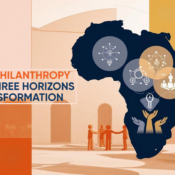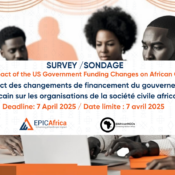Seizing the Moment: Building Africa’s Philanthropy Infrastructure for Lasting Change
A Moment of Recognition
Two things stand out to me in my conversations with civil society leaders and funders across Africa. First, the sudden and damaging funding freeze by USAID is a stark reminder of something we’ve long known: the era of heavy reliance on foreign aid is coming to an end. This fresh crisis reminds us of the turning point we have been facing; the call to build an African-led infrastructure for social impact and philanthropy that is strong, resilient, and rooted in our own realities.
Second, African voices—whether from CSOs, social movements, funders, businesses, or philanthropists—are often missing from global discussions about our future. But let’s be clear: Africa has a vision, and we know what we need to get there. It’s time to elevate those voices and own the narrative about our potential and our solutions.
The Reality of African Giving
Let me challenge a persistent misconception: Africa is resource-poor.
Africa is home to some of the world’s fastest-growing economies. While foreign funding plays a role, it is neither the only nor the most important driver of our progress. The real story lies in our homegrown generosity and innovation. The numbers speak for themselves:
- Remittances to Africa reached $90 billion in 2023, far exceeding official development assistance. Families and communities are sustaining each other in ways that no foreign aid program can replicate.
- Individual giving is a top revenue source for African civil society organizations, as reported by 65% of CSOs. Most significantly, this giving operates at national (56%), international (8%), and pan-African (5%) levels, demonstrating the far-reaching impact of African philanthropy.
- The number of African high-net-worth individuals grew by 4% annually between 2019 and 2023, with many actively investing in social impact.
- Corporate giving is increasingly strategic, focusing on forming long-term partnerships with local non-profits and aligning their efforts with the SDGs to tackle poverty, education, and environmental sustainability.
- Impact investing in Africa surged by 30% from 2020 to 2023, fueling local enterprises that merge profit with purpose. Indeed, Africa hosts 14% of the world’s social enterprises, creating millions of jobs while innovatively creating positive social change.
From community-based mutual aid to innovative digital philanthropy, Africans are funding Africa. What we need now is the right infrastructure to make this giving more effective, transparent, and sustainable. Transformative philanthropy capabilities and resources already exist, ready to be amplified by international and national funding sources.
Supporting Effective Funding Flows
The 2023 Oak Foundation report “Philanthropy Ecosystem in Africa” highlighted what many of us already know: the challenge isn’t just about money—it’s about how money moves. We need systems that reflect our own traditions of giving, rather than trying to fit into Western philanthropy models.
Here’s where we need to focus:
1. Strengthening Homegrown Philanthropy Infrastructure Intermediaries
We need more local and regional infrastructure organizations that can help to connect funders with frontline changemakers. Notable examples are:
- Kenya Community Development Foundation (KCDF), which has built a robust model of community philanthropy that empowers grassroots organizations.
- Southern Africa Trust, which fosters cross-border giving to strengthen civil society collaboration.
- TrustAfrica, a proactive grantmaker partnered with other philanthropies to steward grants and technical support to organizations in 34 African countries.
- Our own African CSO Platform with a pan-African lens.
Connectors like these help channel resources effectively, ensuring that funding reaches those who need it most. A comprehensive look at Africa’s intermediary ecosystem and advice for selecting a partner can be found in the Oak Foundation’s Philanthropy Ecosystem in Africa: intermediary organization profiles.
Beyond infrastructure organizations we also need more African-led donor advised funds, impact funds and cross-border giving circles.
2. Investing in Data and Knowledge Systems
If we want to scale African philanthropy, we need better data. We need to understand who is giving, how much they’re giving, and where those funds are going. We need to support donors and investors in finding the most effective ways to achieve impact and we need to share best practise and minimise inefficiencies and duplicated effort. Artificial intelligence can be an important tool that, properly managed, could provide a leapfrog effect.
Organizations like EPIC-Africa and African Philanthropy Network are already mapping the sector and building toolkits and resources for philanthropists, while West Africa Civil Society Network (WACSI) provides a civil society knowledge sharing hub and Future Africa acts as an incubator for transdisciplinary research projects. However, far greater investment is needed to build comprehensive and accessible databases and services that inform smart decision-making.
3. Building the Capacity of Civil Society Organizations (CSOs)
Most African CSOs operate on less than $100,000 a year. They don’t just need money—they need patient, flexible funding that allows them to strengthen operations, adopt technology, improve fundraising, and scale their impact.
Take SOFEPADI, whose mission is to promote and defend the rights of women and girls in Congo, in particular survivors of gender-based violence. Or BudgIT Nigeria, which provides civil society organizations with the data and tools to advocate for transparency and accountability in government spending. These organizations—and many others—could multiply their impact with the right support.
The Opportunity Before Us
The most exciting thing? African innovation is already addressing these challenges.
Emerging Models of Excellence
- Startpoint Africa, a platform from the African Philanthropy Forum, connects donors directly with verified local organizations.
- M-Changa, a Kenyan mobile crowdfunding platform, allows communities to raise funds digitally for everything from school fees to medical emergencies.
- South Africa’s DG Murray Trust, which blends philanthropy with social innovation, funding initiatives that tackle systemic issues like youth unemployment.
Rising Social Entrepreneurs
We’re witnessing a new generation of African wealth creators who understand the importance of giving back and embed it in their business models.
- AVPA, a pan-African network for social investors with a 900-strong membership.
- LifeBank (Nigeria), a health-tech company, is solving critical blood supply shortages by using data and logistics to match donors with hospitals in need.
- M-Pesa (Kenya), Africa’s leading mobile money service, has revolutionized financial inclusion and philanthropy by enabling direct giving.
A Call to Action for Funders
Philanthropy everywhere is evolving—Africa is no different. To build an ecosystem that outlasts funding shocks, we invite all stakeholders—governments, businesses, philanthropists, and individuals—to take bold steps.
- Think Long-Term
The most transformative philanthropic investments have a 5-10 year horizon. Look at the African Women Development Fund (AWDF), providing multi-year grants to women’s organizations working on gender equality, women’s rights, and social development across Africa as part of a 10 year strategy. Building trust, developing local leadership, and creating sustainable systems takes time. Let’s commit to the long game.
- Support the Philanthropy Ecosystem
Don’t just fund individual projects—invest in infrastructure that enables philanthropy to thrive. Identify infrastructure that underpins or augments your causes. This includes:
- Networks and collaborations
- Infrastructure organizations
- Shared technology platforms
- Knowledge exchange initiatives
- African media platforms that shape the narrative of homegrown giving
- Trust Local Leadership
Our research at EPIC-Africa shows that when local African leaders have decision-making power and flexible funding:
- Innovation flourishes
- Resources are used more efficiently
- Impact is more sustainable
The Path Forward
At EPIC-Africa, we see a future where our philanthropy infrastructure enables:
- Direct capital flow to the most effective or promising local organizations
- Efficient resource mobilization for emerging challenges
- Data-driven decision-making
- Stronger local accountability
This isn’t about replacing international aid—it’s about building something better. Something rooted in African realities and values. Something resilient. We saw glimpses of it during the pandemic when African-led emergency funds mobilized millions in local donations. That’s the spirit we need to build on.
An Invitation to Partner
To funders and philanthropists reading this: the gaps in African philanthropy infrastructure represent an extraordinary opportunity for catalytic investment. Every dollar invested in strong philanthropy infrastructure can unlock multiples in local giving and create lasting systems change.
As we navigate this pivotal moment, let’s not simply respond to a funding crisis. Let’s seize this opportunity to build the infrastructure that will enable African philanthropy to thrive for generations to come.



